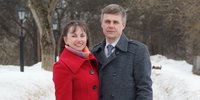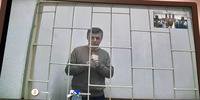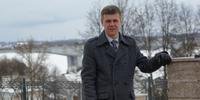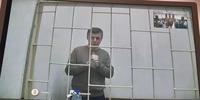The Case of Terebilov in Kostroma
Filter
- #
Dmitry Terebilov's apartment is being searched in his absence. Police officers with a detachment of riot police break down the entrance door to get into the dwelling. They seize electronic media and personal belongings.
- #
The Investigation Department for the Central District of Kostroma of the Investigative Committee of the Investigative Committee of the Russian Federation for the Kostroma Region initiates a criminal case for faith under Article 282.2 (2). According to investigators, Dmitry Terebilov (born in 1980) "Distributing ... literature included in the federal list of extremist materials, containing information inciting religious discord, promoting the exclusivity, superiority of the doctrine of Jehovah's Witnesses and the inferiority of other citizens who do not profess this doctrine ... took part in the meetings held."
- #
The judge of the Sverdlovsk District Court of Kostroma, V. P. Bebeshko, issues a search warrant in Terebilov's apartment.
- #
Terebilov's home is being searched.
- #
The judge of the Kostroma Regional Court, O. A. Panov, upholds the order to search the believer's home.
- #
Dmitriy Terebilov's bank account has been blocked.
- #
Investigator N. A. Tsymlyakov chooses a measure of restraint for Terebilov in the form of a written undertaking not to leave the place and charges him with committing a crime under Part 2 of Article 282.2 of the Criminal Code of the Russian Federation. According to the investigation, in the period from July 17, 2017 to May 25, 2020, Dmitry actively participated in the activities of liquidated religious organizations.
- #
Terebilov's wife is being interrogated as a witness. The investigator announces the end of the preliminary investigation, and a report is drawn up.
- #
Investigator N. A. Tsymlyakov re-charges Dmitry Terebilov with committing a crime under Part 2 of Article 282.2 of the Criminal Code of the Russian Federation, adding some new episodes to the ruling.
- #
The term of the preliminary investigation of the criminal case against Dmitry Terebilov is expiring. The investigator submits a petition to the Sverdlovsk District Court of Kostroma to limit the time for the believer to familiarize himself with the materials of the 9 volumes of the criminal case - this would limit the believer's right to quality protection. Dmitry Terebilov is preparing an objection to this petition.
- #
Deputy Prosecutor of Kostroma E. L. Sokolov approves the indictment and hands it to Terebilov.
- #
In the Sverdlovsk District Court of Kostroma, hearings on the merits of the case begin. The chairman of the court is Oksana Borovkova. Referee — Oksana Borovkova.
Prosecutor Svetlana Gryaznova announces the indictment to Dmitry Terebilov. According to the document, the defendant "actively participated in the activities of the religious organization 'Administrative Center of Jehovah's Witnesses in Russia' liquidated in connection with the implementation of extremist activities and the local religious organization of Jehovah's Witnesses in Kostroma, which is part of its structure ... in order to disseminate the ideology and values of the doctrine of Jehovah's Witnesses, which incites religious discord, promotes the exclusivity, superiority of the doctrine of Jehovah's Witnesses and the inferiority of other citizens who do not profess this doctrine, on the basis of their attitude to religion ...
The defendant does not understand the meaning of the charge, since he was not a member of prohibited legal entities, and the Supreme Court of the Russian Federation did not assess the beliefs of Jehovah's Witnesses and did not prohibit the practice of their religion. Terebilov claims that he has never carried out extremist activities, and violence is incompatible with his religious beliefs. He emphasizes that he respects representatives of other religions, considers the criminal case against himself to be religious repression.
Prosecution witnesses are scheduled to be called at the next hearing.
- #
Prosecution witnesses are being questioned, including CPE employee Alexander Igumnov. During the interrogation, Igumnov cannot give specific testimony on any of the charges. He refers to the fact that he has forgotten a lot, although there is a protocol of his interrogation dating back to May 2020 in the file. "I know it all kind of superficially," he explains, "it's just my opinion." Igumnov has nothing to say about Terebilov as one of Jehovah's Witnesses.
The lawyer also draws attention to the fact that the same witnesses participated in the investigative actions for several years.
- #
The questioning of prosecution witnesses is ongoing. The defense is interrogating witness Kochurov, a former prisoner with whom Dmitry Terebilov has been in correspondence since 2015. During the interrogation, it turns out that Kochurov's testimony completely contradicts his own letters, which he wrote to the believer from prison.
As can be seen from Kochurov's letters voiced in court, he was keenly interested in biblical teachings, assured Terebilov of his faith in Jehovah God and his desire to serve him. He also told Dmitry that he was pleased to communicate with him. However, at the trial, Kochurov stated that "correspondence with Terebilov did not give [him] any pleasure." The witness cannot answer the believer's question: "Why did you communicate with me?" To the lawyer's questions whether Terebilov made insulting statements about other religions, whether he called for inciting interreligious hatred, disobedience to the authorities or refusing medical care, Kochurov answers in the negative.
Another prosecution witness says that this is the first time she has heard the name "Terebilov".
- #
The questioning of prosecution witnesses is ongoing. One of them claims that he has not heard extremist statements and appeals from Dmitry Terebilov. He notes that the believer, on the contrary, called for obedience to the authorities. The witness describes Dmitriy as "a rather positive, sympathetic person ... ready to help others without any obligation or personal gain." As an example, he cites two cases when, together with the defendant, he helped an elderly woman and a large family.
Sergey and Valeria Rayman are being interrogated. Sergey says: "[Dmitry] has changed his life for the better and is trying to be a law-abiding citizen. He said that in the past his life was not very prosperous, but now I know him well. He's a good family man. I know I care about my uncle. [...] He helps others when they turn to him." Valeria Rayman describes Dmitry Terebilov as a "kind, good person" who helped her family more than once.
- #
The prosecution witness, who was also searched, speaks positively of the defendant: "As a person, he is good, trouble-free, you will not hear a bad word."
The witness says that no one forced him to discuss the Bible, he himself was interested. The witness confirms his testimony given during the preliminary investigation only partially. When asked by the judge what, in his opinion, the defendant's activities were, the witness replies: "He lives according to the Bible."
He and another witness claim that Dmitry Terebilov did not call for religious extremist activities, disobedience to the authorities, refusal of medical care and military service, and also did not express the superiority of Jehovah's Witnesses over other religions.
- #
Farida Akhunzyanova, an employee of Kostroma State University, who carried out an examination of audio recordings of conversations of believers, is being interrogated. Commenting on Dmitry Terebilov's remarks, she explains that she did not find any words or expressions in them that would indicate the inferiority of citizens professing another religion. With regard to other materials that were provided for examination, Akhunzyanova states that they do not relate to Dmitry Terebilov, but to the organization of Jehovah's Witnesses as a whole.
- #
The court gets acquainted with material evidence, including the Bible in the Synodal translation.
- #
Interrogation of a specialist in the field of the history of religion N. S. Mayorova. It affirms that religious beliefs are an inner, personal choice, and that joint worship services performed by Jehovah's Witnesses are a way of expressing religious beliefs. "We have freedom of conscience in our country," she says.
- #
Sergey Ivanenko, Doctor of Philosophy, a religious scholar who has been researching the doctrine of Jehovah's Witnesses for many years, speaks at the hearing. He speaks positively of the followers of this religion. The court shall attach to the case file a specialist's religious studies.
- #
The testimony is given by the witness O. A. Shellova, a relative of Dmitry Terebilov, who does not share his religious beliefs. She characterizes Dmitry as a sympathetic person, ready to help free of charge. According to her, the defendant does not abuse alcohol, does not smoke, does not use obscene language and he has good relations with neighbors.
Shelling informs the court that Terebilov used to have a hard life, he even sat in prison, but then he became a believer and changed for the better. These changes in Terebilov also affected the life of his uncle, who until 2013 lived with a relative who mistreated him and regularly beat him. Upon learning of this, Dmitry Terebilov took his uncle to him, now he is no longer starving and looks well-groomed. Living with his nephew and his wife, he quit smoking. Obolochkova calls Terebilov "a true Christian."
- #
Judicial pleadings begin. In his speech, the prosecutor refers to the fact that Dmitry Terebilov was previously convicted. Therefore, the prosecution demands that his "new crime" be recognized as a recidivism, which consists in the fact that after the ban on legal entities of Jehovah's Witnesses in Russia, he did not change his religious views. At the same time, the prosecutor admits: "No one forbade Terebilov to exercise his rights to freedom of conscience and religion of Jehovah's Witnesses."
The prosecution requests punishment for Terebilov: 5 years of imprisonment in a strict regime colony and 1 year of restriction of freedom.
- #
The debate of the defendant's lawyer. He makes a detailed analysis of the charges, pointing to the inconsistency of the evidence base, including the violations committed during the investigation of the criminal case.
- #
Dmitry Terebilov took the floor in the debate. He draws attention to the participation of dubious experts and witnesses in the case, to the use of knowingly false information in the materials. Thus, he points out that Farida Akhunzyanova in her examination considered the famous religious scholar Sergey Ivanenko to be Jehovah's Witness only because he quotes the Bible in his book.
Terebilov says that the material evidence in the case is subject to destruction, while among them are 10 copies of the Bible in a translation that is not prohibited on the territory of the Russian Federation. The believer compares this fact with what happened during the medieval Inquisition.
Dmitriy Terebilov says: "Violence is incompatible with the religious canons by which I live. It was thanks to what was written in the Bible that I began to change my life for the better and get rid of bad habits (smoking, foul language, drug use). I have a family, which I value very much, so the accusation of undermining family relations sounds ... ridiculous and unfounded." The believer asks the court: "Why should I stop practicing my religion? Why should I stop associating with fellow believers? Why should I stop reading the Bible, praying, telling others about God? [...] And why should I go to a colony for 5 years for this?"
The prosecutor calls on the court to be critical of the testimony of religious scholar Sergei Ivanenko, to whom Terebilov refers. The prosecution motivates this only by the fact that information about this specialist can be found on the website of Jehovah's Witnesses, which is banned in the territory of the Russian Federation.
- #
The last word of the defendant Dmitry Terebilov in Kostroma - #
Judge Ekaterina Molodova convicts Dmitry Terebilov. The believer was sentenced to imprisonment in a strict regime colony for 3 years.
Dmitry is taken into custody and placed in pre-trial detention center No. 1 of the Federal Penitentiary Service of Russia in the Kostroma region. He can write letters.
- #
The lawyer visits Dmitry Terebilov in the pre-trial detention center. The believer is kept in solitary confinement. After the verdict was announced, his cells were changed several times. He thoroughly washes each one and then maintains cleanliness and order in it. The window in one of the cells did not close well, which made the room cold. At the request of the believer, the staff of the pre-trial detention center repaired the window.
Terebilov has his own copy of the Bible. The believer reads a lot, using the local library.
Dmitry has the opportunity to regularly call and write to his wife, twice a month they are given a date. In addition, he is supported by fellow believers: they give products and send letters of support - over the past 3 months, he received 1400 letters from 47 countries of the world.
- #
19 people are allowed into the meeting room, including the father of the believer, who came to support Dmitry Terebilov.
The Kostroma Regional Court dismisses the appeal. The verdict comes into force.
- #
It becomes known that Dmitry Terebilov was placed in Correctional Colony No. 1 in the Kostroma Region. This is a strict regime colony, so parcels or parcels should not be sent to the believer. He can write letters.
- #
- #
- #
It turns out that since the end of May 2023, Dmitry has been in Kostroma pre-trial detention center No. 1 to participate in investigative actions in his new criminal case.
- #
The believer returns to his former place of serving his sentence - to correctional colony No. 1 in the Kostroma region. He can write letters. Parcels and parcels should not be sent
- #
The wife of Dmitry Terebilov reports that for some time he has not been given letters containing the name of God Jehovah, although it is not forbidden to use and it can be found in famous works of literature.
- #
The conditions of detention in the colony are satisfactory. Dmitriy has a Bible, as well as the opportunity to regularly communicate with his wife on the phone and receive letters of support.
The believer works as a janitor and handyman. This allows him to buy groceries from the colony's store.
- #
Dmitriy Terebilov submits an administrative complaint to the Sverdlovsk District Court against the written response of the head of the colony. In it, the administration informed Dmitri about the ban on using the name of God in letters and professing the religion of Jehovah's Witnesses in the colony.
In his statement of claim, the believer says: "I understand the order of the Investigative Committee set forth in the contested letter that 'it is forbidden to profess the religion of Jehovah's Witnesses' as a direct prohibition to exercise the right guaranteed by Article 28 of the Constitution of the Russian Federation. For turning to God in prayer, reading the Bible, telling others about my beliefs, I can be subject to disciplinary sanctions, although such actions are absolutely normal for representatives of other religions and there is nothing illegal in them. The excessively broad position of the administrative defendant, expressed in the letter, is devoid of certainty and leads to arbitrariness and abuse of power." Dmitriy asks the court to recognize the response of the administration of the colony as illegal and to eliminate the violation of his rights and freedoms.
- #
The Sverdlovsk District Court rejected Terebilov's complaint about the ban on using God's name in letters and professing the religion of Jehovah's Witnesses in the colony. Although Judge Olga Telezhkina, by her decision, prohibits the believer from calling God by name and communicating with other convicts on biblical topics, the court believes that "the contested answer does not prevent the plaintiff from adhering to his chosen faith."
- #
The Kostroma Regional Court upholds the decision on Dmitry Terebilov's administrative claim against the decision of the Sverdlovsk District Court. The court refuses to declare unlawful the ban of the head of the colony on the practice of Terebilov's chosen religion.
The lawyer explains what Terebilov fears in connection with the decision of the head of IK-1: "Whatever he does: read the Bible, pray to God, tell others about his faith, this can be equated with breaking the law."
Dmitry participates in the process via video conferencing from the pre-trial detention center. The meeting is attended by 10 listeners.
- #




